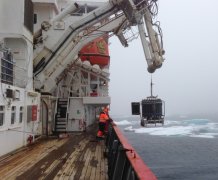
The RSS James Clark Ross research vessel.
Exeter researchers investigate how oceans store greenhouse gas
A team from the University’s new ‘Exeter atmospheric and ocean sciences’ unit joined a research cruise earlier this year to investigate the change in storage of greenhouse gases in the waters of the North Atlantic Basin. Results of the research will help provide warning of any fundamental change in the North Atlantic Ocean, resulting in improved forecasts of the ocean's ability to uptake and store greenhouse gases.
The researchers joined the two month cruise on the RSS James Clark Ross research vessel in St John’s Canada. Their route back to the UK crossed the outflows of the Labrador, Arctic and Nordic Seas, all important contributors to an ocean current conveyer belt, the Atlantic Meridional Overturning Circulation. Depth profiles of dissolved chlorofluorocarbons and sulfur hexafluoride (SF6), proxy parameters of anthropogenic carbon, were measured en route.
The cruise was the first field campaign of the RAGNARoCC (Radiatively active gases from the North Atlantic Region and Climate Change) oceanographic project which aims to investigate the air-sea fluxes of greenhouse gases in the North Atlantic region. It is part of the Greenhouse Gases UK program (http://www.greenhouse-gases.org.uk/ragnarocc).
The North Atlantic basin is a major repository for anthropogenic carbon but the rate at which this uptake is occurring at the sea surface varies substantially on annual and decadal time scales. Data from hydrography-biogeochemistry oceanic sections are used to reconstruct the interior inventory of carbon.
The new unit, based in Geography at the University of Exeter, is primarily involved in observing and understanding the global carbon cycle, both in the past and in the present. Researchers in the unit have expertise in making precise measurements of carbon dioxide, and other greenhouse gases, as well as other man-made compounds such as chlorofluorocarbons (CFCs) in the atmosphere and the oceans.
Date: 27 October 2014


